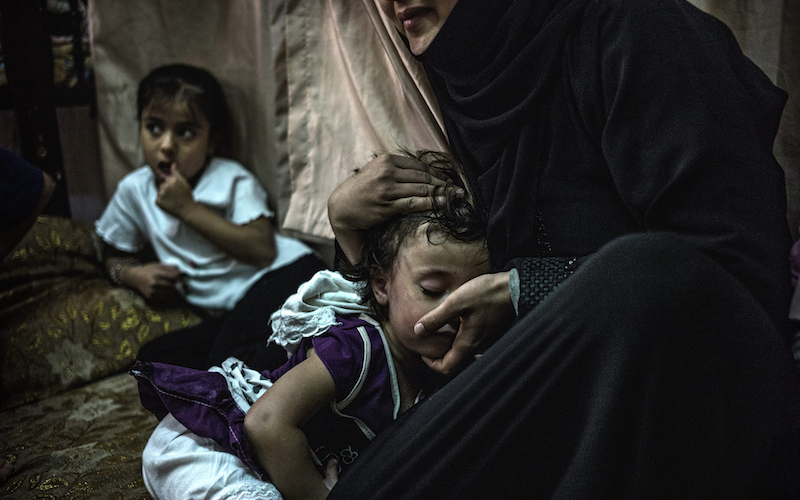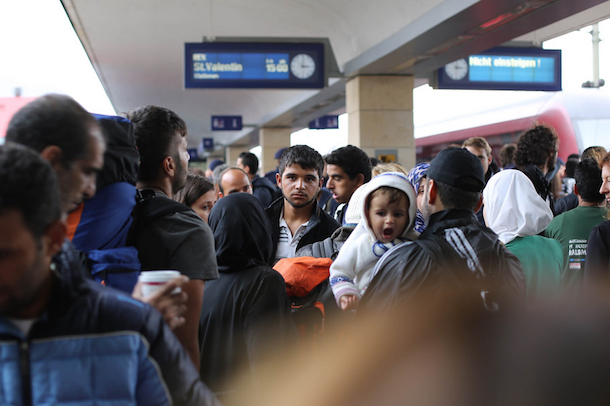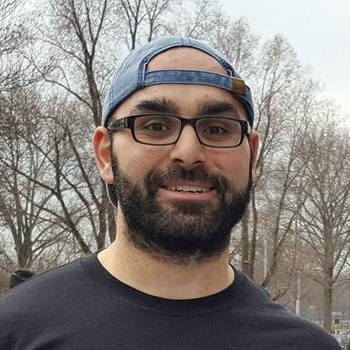
Running From The Past, Sprinting Towards The Future
We are in the midst of the world’s largest humanitarian crisis. The number of registered refugees that have fled out of Syria and poured into neighboring countries is approaching 5 million. Globally, the number of displaced innocent victims of violence and terror has reached 65.3 million. While some countries have welcomed refugees with open arms, many others have not. Common misperceptions are that these refugees will be a threat to national security as well as a drain on the local economy and government resources. In fact, these assumptions could not be further from the truth.
The word ‘refugee’ is often associated with being vulnerable, uneducated, and incapable. But before external circumstances stripped them of their lives and left them searching for a place to call home, they were skilled, highly educated, and extremely independent. These refugees do not want our pity and they do not want to be dependent on humanitarian aid and relief. What they want is empowerment – the ability to legally work and provide for themselves and their families. Beyond this, they still hold on to hope that one day they will be able to return to Syria. This hope is the primary thing enabling them to endure and fight to keep living.
The stories below are just a few of countless others that highlight the resolve and entrepreneurial spirit of refugees who hold steadfast to their dreams in light of dire circumstances. My hope is that this article will serve to change the discourse on the perception of refugees as helpless and hopeless; that it will display the unbreakable nature of the refugee spirit clinging to hope when they have nothing left to hold onto.
Business is booming in Malmö’s Jasmin Alsham, the newest restaurant opening in Malmö, is a sign of the influx of unexpected Syrian money being injected into Sweden’s third largest city. Fisal Abo Karaa and his partners have invested nearly $600,000 into this venture and are not the first to do so, with five other Syrian restaurants having opened this year alone. This fresh investment in Sweden has transformed a slumping city into a now busy center at Möllevång Square, full with a bustling vegetable market and shops selling Arab goods. In Malmö, these immigrants have been essential to growth and prosperity. Despite concerns of a strain on the local economy, Sabah Akkou, who opened Damaskus, a small backstreet restaurant near Möllevång, stresses that Syrian people are different. Akkou emphasizes that they like to work and have long been opposed to taking anything from the government. Almi, a state-run bank that gives loans to immigrants starting businesses, has been at the forefront of this movement, funding 50 new Syrian business. It has plans to help hundreds more succeed, like the booming Hello Shisha business which rents and delivers hookahs throughout the city.
Abu Mahmood is a Syrian refugee in Jordan. He is also the owner of Pizzeria of Peace, making and delivering pizza mostly to aid workers and refugees located in the distant parts of Za’atari Camp. Abu Mahmood started by selling orange juice to support his family and then borrowed money to transition into the pie business. The Pizzeria of Peace is open on the aptly named ‘Champs-Élysées,’ a bustling commercial street in the camp. This is yet another example that shows that the desire of the refugees is not to wait for help, but to be proactive and create their own opportunities. While Abu Mahmood is happy with his business, like many others he still has his eyes on returning home and is hopeful to open a pizza place in Syria when he and his family go back.
Opportunity Arises in Azraq
Taking inspiration from the Champs-Élysées, aspiring business owners showcase their products at the bustling souk in Azraq camp, such as 42 year old Mohammad who sells artificial bouquets of flowers he has arranged. In another stall, 39 year old Muhannad offers haircuts and razor shaves. Muhannad used the 20 dinars given to him by UNHCR shortly after he arrived in Jordan to buy new equipment and began cutting hair in his shelter, initially in Za’atari camp and now at Azraq. These hopeful entrepreneurs are convinced that there is enough demand in the camps to sustain a business. Others came to the market and bought clothes, sweets and falafel. For them, the marketplace not only creates a sense of community and a meeting place for the many who currently have no place to call home, but also remains a symbol of hope.

Entrepreneurialism is often fantasized in the West where risking it all for your dreams and making it big is the ultimate accomplishment. But in reality this ‘risk’ is actually quite limited. While western entrepreneurs are highly motivated individuals who make significant sacrifices, they generally have a safety net of a steady income and a safe place to live if all else fails. For Syrian refugees however, being an entrepreneur is sometimes their only way to make a living. Across the world, immigrant populations have stimulated local economies and led to growth through their benefits to labor markets, the public purse, economic growth, and business creation. A recent study found that 40 percent of Fortune 500 companies were founded by immigrants or their children.
The majority of refugees all share the same undying desire to return home one day. However, the reality is that there is a long road ahead before we can even begin to imagine the return of Syrians to their motherland. It is imperative that the international community follows the lead of these entrepreneurs, adopting a longer term approach and investing in the future of refugee children. These children make up about half of all refugees globally and will one day be called upon to return home and lead massive rebuilding efforts. If we don’t invest in the children, we don’t invest in the future of Syria, and if we fail in doing that we fail in giving these refugees the only thing they have left: hope.
Losing Hope
Many of these refugees tried to stay in Syria as long as possible. They preferred to stay and face the dangers rather than become refugees before the situation became entirely too violent. They left behind family members and began their treacherous journey in hopes of safety. However, many refugees are now leaving their countries of first asylum due to hardships and loss of hope. Outside of the camps, 86 percent of the urban refugee population in Jordan live below the poverty line and have tried returning to the camps that are nearly at capacity. With their savings gone, assets drying up, and World Food Program vouchers cut, these individuals are in complete desperation.
Faced with no job opportunities and no housing or a rent that is way too expensive, these refugees are forced once again to find a place that will give them what they want: a legal opportunity to work and rights for them and their children. Camps are absolutely essential in terms of offering shelter, food, and healthcare to refugees. Za’atari and Azraq serve as sufficient holding areas for the 110,000 living there. But what happens when we start thinking outside of the tent? About 80 percent of refugees in Jordan live outside of the camps – this is where the challenge looms larger. Through increasing refugee access to employment and education they can be set up on the road to success and self-sustainability.
Work Access
Rising rent, inadequate housing, and educational challenges result in individuals that are struggling to keep roofs over their heads and earn enough money to get by. In order to adequately support their families, individuals aged 19-24 desperately need skills training and the tools to rebuild.
There was finally some progress in work access in April 2016 when Jordan created a three month window allowing employees to obtain free work permits that could benefit tens of thousands of refugees. The waived fee should regularize employment for refugees and helps employers of Syrians avoid legal fees. In countries accepting large quantities of refugees, there need to be more programs like the pilot project ‘Better Work Jordan,’ which increases access to labor and hosts job fairs for refugees. It is necessary that refugees around the world have increased access to work so that they can support their families and build a future for them and their children.
Education
A recent study on urban refugees found that 61 percent of Syrian children in Jordan did not attend school and that 5 percent who had enrolled in school had dropped out. These children have already lost their past; they cannot afford to also lose their future. Only by investing in the education of the youth can the international community begin to reverse the effects of the violence that shattered the aspirations of millions of young Syrians and robbed them of opportunities to build a future for themselves and their war-torn countries. Higher education will continue to play a large factor in economic development, and fortunately this is a factor the international community has not forgotten. The Said Foundation funds two-thirds of scholarships UNHCR gives to Syrians to attend universities in Jordan and Lebanon. A $1.8 million grant used to send 100 Syrian refugees to university demonstrated a long term commitment to education as a force for change and good.
The importance of higher education access to Syrian refugees cannot be understated. Alaa, a Syrian refugee who studied by lantern while at Za’atari, recently earned the distinction of the highest grade in her class at the University of Jordan, where her studies are funded through the UNHCR DAFI program. With little prospect of returning home, and with a fairly stable infrastructure in Jordan, other young refugees like Alaa now focus on long term challenges such as employment, skills training, and education. Alaa believes that education is a building block to society. These building blocks will be of utmost importance for the future leaders who will be called back to rebuild Syria brick by brick.
Conclusion
Despite the tragedy and loss for the Syrian refugees, opportunity still exists. The international community stands at a pivotal moment where it can significantly impact the trajectory of millions of individuals’ lives who have been struck directly by violence. Host countries have the opportunity to help refugees start anew with nothing more to lose and everything to gain. Welcoming these refugees and their investments in these countries can have huge payoffs. These refugees did not ask to be forced from their homes, and they are not asking for help now. They are only asking for a chance. Despite a terrible past they remain hopeful for the future and believe they can succeed through hard work, just like any entrepreneur. The task is a tall one, but when the time comes to begin rebuilding efforts, today’s Syrian children must be just like their parents: resolute, determined, and innovative in finding a way to press on despite adversity. It is our job to make sure they have the tools to be ready to rebuild for themselves and the future of their country.
